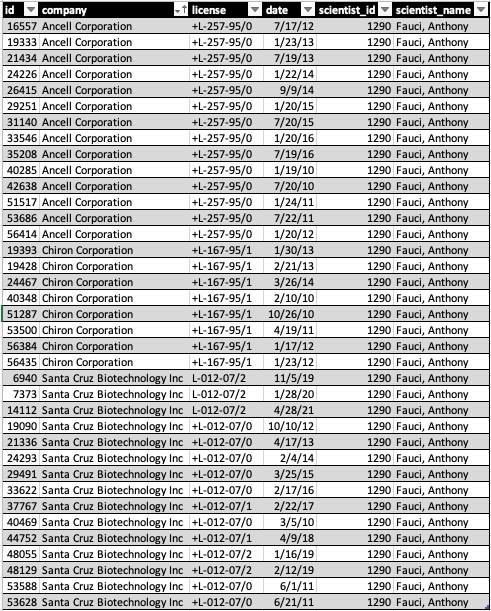OpenTheBooks finally got its hands on a National Institutes of Health (NIH) database showing which of its scientists received royalties from pharmaceutical companies.
The agency ignored Freedom of Information Act requests from the OpenTheBooks team, but they’re losing the court battle to shield the identities of individual scientists benefitting from taxpayer-funded drugs.
The Washington Examiner highlighted the painstaking process of discovering the depths of third-party royalty payments made to scientists.
For years, the NIH has worked to keep hidden a stream of third-party royalties paid to its scientists by for-profit companies. These payments flow when a medical innovation made as part of NIH research is used by the private sector and government employees are considered “co-inventors” on the patent. There were approximately 55,000 of those payments during the past decade. Each royalty could be a conflict of interest that requires transparency to investigate.
After the agency ignored Freedom of Information Act requests from OpenTheBooks’s data capture team, we sued the agency, represented by the group Judicial Watch. Only recently and under court order has the NIH begun disclosing the amount of money changing hands with the private sector for these innovations. As officials slow-walk the royalty data release, we can say that the NIH and its scientists received an estimated $400 million in third-party paid royalties between March 2010 and today and that they dole out around $32 billion a year in research grants across the medical community. Concurrently, decisions inside the NIH, the Food and Drug Administration, and the wider Department of Health and Human Services were made regarding product approvals, public health guidance, and continuing research priorities.
OpenTheBooks wasn’t alone going after this egregious corruption at the expense of American taxpayers.
Senator Rand Paul (R-KY) pressed NIH leaders, including Anthony Fauci, for this information at congressional hearings.
“I tell you this when we get in charge, we’re going to change the rules. And you will have to divulge where you get your royalties from, from what companies, and if anybody on the committee has a conflict of interest, we’re going to learn about it. I promise you that,” Paul said.
"I tell you this when we get in charge, we're going to change the rules. And you will have to divulge where you get your royalties from, from what companies, and if anybody on the committee has a conflict of interest, we're going to learn about it. I promise you that." pic.twitter.com/k0O6wVmLNt
— Senator Rand Paul (@SenRandPaul) September 14, 2022
“Newly released NIH documents show conclusively that statements made during congressional hearings to U.S. Sen. Rand Paul (R-KY) and Rep. John Moolenaar (R-MI) by NIH leaders Anthony Fauci and Lawrence Tabak were misleading, if not outright false, regarding third-party royalties paid before, during, and after the pandemic,” OpenTheBooks wrote.
“The newly released documents reveal – for the first time – the names of companies that paid NIH scientists $325 million in third party royalties from 56,000 transactions between September 2009 and October 2020.”
OpenTheBooks noted some of its findings:
- Chinese government-owned pharmaceutical companies, controlled by the Chinese Communist Party (CCP), paid the National Institutes of Health (NIH) third-party royalties to license technologies developed on the U.S. taxpayer dime. One such company neighbors the Wuhan Institute of Virology, collaborates with the lab, and even paid a royalty to Douglas Lowy, a multiple term acting director at the National Cancer Institute, a sub-institute of NIH.
- Russian animal vaccine maker – which was allegedly a front for a Soviet bio-weapons lab – licensed inventions and paid royalties to NIH for tech developed with taxpayer dollars.
- Purdue Pharma – the makers of the highly addictive and frequently abused OxyContin (oxycodone) – licensed tech developed with public funds and paid royalties to NIH – even after the company pleaded guilty to federal crimes relating to opioids.
- Long-serving former NIH director, Francis Collins, received third party royalties on his inventions from four companies that themselves received nearly $50 million in federal contracts and grants since 2008.
The NIH documents obtained by OpenTheBooks illustrate how Big Pharma has captured federal agencies that have no business existing in the first place.
NIH took royalties from Wuhan lab collaborator, alleged front for Russian bioweapons: records | Just The News https://t.co/EAbgx22UlJ
— John Solomon (@jsolomonReports) August 10, 2023
Just the News reports:
It cites investigative reporting by Just the News founder John Solomon from nearly two decades ago at the Associated Press, based on FOIA requests that revealed royalty payments to Fauci among others.
NIH spent $36 million to test an experimental HIV treatment developed by Fauci, which New England Journal of Medicine and Cochrane studies found ineffective. Fauci received about $45,000 in royalty payments from 1997-2004 from Chiron Corp., which was soon acquired by Novartis, which itself has since made more than 300 royalty payments to NIH. Fauci received another eight payments from Chiron since 2010.
“NIH spends billions on the industry, and now we know the industry sends millions back to NIH and its scientists,” OpenTheBooks CEO Adam Andrzejewski wrote in the report.
In an interview with Just the News, Andrzejewski said the cozy relationship between NIH and drug companies raises further concerns about conflicts of interest that can affect public safety and shake public trust.
” I think during the pandemic, John, the American people started to feel that big government was very close to Big Pharma. And this is a database that shows you empirically just how close they are,” he told the John Solomon Reports podcast.
Substack writer Justin Hart tallied the list of royalties for Anthony Fauci.
“Dr. Fauci himself gets royalties from some 37 different patents/agreements (believe it or not, that’s on the low side – some have 500+),” Hart writes.
BREAKING! Secret NIH database of royalties assigned to scientists is out. Dr. Fauci himself gets royalties from some 37 different patents/agreements (believe it or not, that's on the low side – some have 500+). https://t.co/1OqZ0XlZaV pic.twitter.com/kF6s2U1dhL
— Justin Hart (@justin_hart) August 9, 2023
Justin Hart writes at Rational Ground:
I don’t begrudge patent holders their due. The BIG question is… did anyone profit from Remdisivir?
Transparency Watchdog reveals Fauci, Collins received 58 royalty payments as NIH collected $325M from companies | Just The News https://t.co/ADefHqYxv6
— John Solomon (@jsolomonReports) August 9, 2023
You can investigate the NIH data yourself HERE.
A handful of pharmaceutical companies that gave NIH scientists royalties from taxpayer-funded concoctions include:
- Abbott Laboratories
- BioNTech
- EliLilly Company
- Janssen Biotech
- GlaxoSmithKline LLC
- Gilead Sciences
- Moderna Therapeutics
- Merck
- Pfizer
- Purdue Pharma
- Novartis
- Sanofi Pharmaceuticals




Join the conversation!
Please share your thoughts about this article below. We value your opinions, and would love to see you add to the discussion!